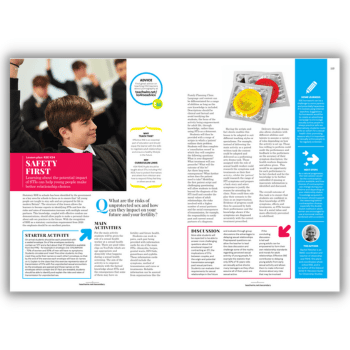Relationships and sex education – Advice for secondary teachers

We cover the importance of teaching RSE, how to teach consent, how to keep parents in the loop and more…

- by Teachwire
- Classroom expertise and free resources for teachers

From September 2021, the government’s statutory relationships and sex education curriculum for primary and secondary schools came into effect. Read on for advice about how to teach this delicate subject…
What is relationships and sex education?
According to the Secretary of State for Education, children need to know “how to manage their academic, personal and social lives in a positive way.”
On sex and relationships specifically, RSE “should teach what is acceptable and unacceptable behaviour in relationships.”
Why boys and girls should take RSE lessons together

Is there a case to be made for single sex RSE classes – fewer distractions, a sense of being able to speak more freely – or are boys and girls better off learning together? Rachael Baker explains why she’d sooner opt for the latter…
“What the HELL is that, Miss?”. Torjion (Y8, never known for his diplomacy) has just clapped eyes on his first ever mooncup.
I can see his point. They are somwhat odd-looking, especially when held open side down so that they resemble a little rubber elf hat…
Cue Tilda, who leaps in with “Nah, they’re good. Pop it up your vajayjay and it catches all the… you know.” I thank Tilda for her contribution, and gently remind her that we should be using correct terms wherever we can. Torjion’s face has meanwhile morphed from shock to bewilderment. “But it’s massive!”
“Not as big as a baby’s head!” chimes in Letitia. “And they do fold up,” I add, while nimbly demonstrating two different ways in which you can fold a menstrual cup to insert and, with help from a life-sized model borrowed from biology, showing how they cleverly pop open once inserted.
Teaching by halves
I have a thick skin when it comes to relationships and sex education lessons. I’ve seen a lot of change over the many years I’ve been teaching the subject. But one development I’ll absolutely hang my hat on is the importance of mixed sex classes for relationships and sex education.
Far from being a horror show, the beautiful exchange highlighted above would only ever be possible in a mixed class.
Without mixed teaching, how else is a young man like Torjion ever going to learn about the lived experience of his female peers?
The question of whether to opt for mixed or single-sex classes has always been something of a hot potato in the relationships and sex education world.
But the evidence so far is clearly in favour of mixed. It ensures that learners hear the voices of their peers. And while it can be tricky at times – as with most things in the classroom – that’s often down to us more than them. Done well, it’s marvellous.
Puberty education
That said, I do understand the anxieties that surround mixed-sex groupings for relationships and sex education, particularly in the context of puberty education.
I get it. It harks back to those covert ‘big chats’ children have with parents or older siblings. Here, every detail and practical consideration of the puberty they’re about to embark on is unpacked and analysed.
Boys hearing the brass tacks about erections, wet dreams and noticing sexy ladies. Girls getting a practical guide to ‘sanitary products’ (or ‘menstrual products’, as we could more positively refer to them, rather than embedding negative stereotypes about menstruation being unclean) and a firm warning to keep well away from boys, lest you get pregnant…
It doesn’t help, though, to only teach them half of it all. Boys and young men need to hear about sexuality from their female counterparts, and vice versa.
They all need to hear about it from each other. Even if we taught the full relationships and sex education curriculum to single-sex groups, they would still miss out on the brilliant process of hearing one another speak about their views, and the shape of the world in their eyes.
Ultimately, they need to understand what sex and relationships mean to one another.
Misplaced assumptions
It’s also impossible to be truly gender inclusive and trans-inclusive in single-sex settings. A potential risk of single-sex groups is that relationships and sex education is imagined heteronormatively. This can lead to assumptions that girls and boys will only ever be attracted to each other, while failing to be inclusive of diversity in sexual orientation and gender identity.
Gone are the days of ‘all girls together’ and ‘boys will be boys’. Instead, let’s talk about how menstruation is something which affects most girls and women, and people with a uterus.
Let’s talk about how most boys and men, and people with a penis will experience wet dreams and untimely erections.
Let’s talk about the act of sex in terms of what consenting adults may choose to do with their bodies. This is rather than getting bogged down in those biology diagrams depicting ‘penis in vagina’ sex.
From our experiences of training educators and supporting schools at the Sex Education Forum, we hear that the reluctance some educators and parents have for supporting mixed relationships and sex education groups stems from concerns that teaching young people about sex is going to make them want to try it.
Actually, we know from many studies that this simply isn’t the case. Conversely, when people receive timely, evidence-based relationships and sex education, they’re actually less likely to experience first sex under the age of 16. They’re more likely to know how to keep themselves safe when they do.
Tear down the stereotypes
One of the biggest issues facing our learners and schools today are the horrifying findings of Ofsted’s 2021 review of sexual abuse in schools and colleges.
It found that over a third of female students at mixed-sex secondary schools have personally experienced some form of sexual harassment at school.
In school we need to openly tackle sexual harassment, consent and the way we make others feel with our comments and behaviours.
Rather than separating our learners, we need to bring them together. We need our learners to adopt a collaborative approach to tackling sexism, misogyny, homophobia, transphobia and biphobia. We need to create a generation of young people who are the change-makers.
Let them tear down the stereotypes and raise their expectations for equality.
There is, of course, an authenticity that comes from learning about something practical from someone who has experienced it.
But if we’re getting hung up on whether we need to have experienced the thing itself before we can teach about it, that means we’re not adequately distancing our teaching from our own personal lives.
We’re not there to provide personal recommendations or reflect on our personal experiences. We’re there to facilitate our learners’ explorations in the subject.
If we don’t feel safe delivering content that doesn’t personally affect us, then I suspect one of two things is at play.
Either we need to bolster our subject knowledge, or we require a more robust Working Together agreement to ensure that both we and our learners feel safe.
We need teachers to feel safe in delivering relationships and sex education. Young people tell us that they want to learn from us, from role models. They want men to teach them, as well as women.
Additions and exceptions
There may be times when it feels right to deliver certain content in single-sex groups. That might include:
- an intervention for boys based around exploring issues of toxic masculinity
- a one-to-one session for someone who has experienced assault prior to a whole class lesson
- an extra lunchtime session for girls to ask further questions about periods
In those instances we should make these models available to learners. But they should serve as an addition, and be the exception, rather than the rule.
Supporting teachers and learners to feel safe in relationships and sex education lessons is a frequent topic in the teacher training that Sex Education Forum offers.
We give teachers the opportunity to consider their values around the subject, explore ways of approaching triggering topics and learn how to plan effective lessons.
My advice here would be to make your learning space safe. Take the time to build your group. Create a ‘Working Together’ agreement that sets out how you’ll behave to one another, and how you can challenge views respectfully.
Use inclusive language and include all learners in the dialogue. Challenge gender stereotypes, and teach
about consent.
These are the cornerstones of truly outstanding relationships and sex education. We can best deliver them to mixed groups.
Rachael Baker is a senior RSE specialist at the Sex Education Forum. She is a qualified teacher with extensive experience of teaching across various secondary, sixth form and special needs settings. For more information, visit sexeducationforum.org.uk or follow @sex_ed_forum
How to teach consent

Thalia Wallis and Pete Wallis outline the approach schools should take when broaching the topics of relationships and consent with their students…
Every school or other youth setting will have a different arrangement for delivering workshops on consent.
It is important when designing a programme that you adequately prepare staff and that they are willing. This is rather than simply being given the materials and directed to get on with it. If resources allow, it’s ideal for a male worker and a female worker to co-facilitate workshops on consent.
They can be a challenging and potentially exhausting programme to manage. The group may become excitable, or a conversation might trigger a reaction which leads to someone becoming distressed.
Two adults will allow one to follow a child out of the room if they need time out or to manage a disclosure. Having another adult in the room, even if they don’t deliver the material, feels supportive and allows for reflection at the end of the session.
Be prepared
Launching into a workshop with a group of young people on sexuality, rape culture or pornography can feel daunting.
Conversations about consent raise delicate issues that can be challenging for us adults as well as for young people. It is important to consider your knowledge and skills, resilience, resources and support. Ask yourself – am I prepared for this?
Before starting a topic, take time to understand the issues, your professional duties and the resources available.
Have a copy of the legal definition of consent available. You need to feel comfortable and confident talking about:
- sex and consent
- consent and the law
- same-sex relationships
- healthy and unhealthy relationships
- equality
- positive sexuality
- porn
- abuse
- sexting
- gender identity
Involve colleagues in your planning and build in sufficient time for preparation, practice and reflection, drawing on them for support.
This is not easy stuff to teach. The material or reactions of the young people may trigger something in you.
Check to see what training is available – for example, through the PSHE Association. (In one survey, 80% of parents thought that teachers should receive training in teaching relationships and sex education).
Right and wrong
Take account of your own wellbeing, ensuring that you have sufficient personal resources, support and supervision.
In the context of your wider team, consider individual and collective responsibilities – who needs to be involved in doing what?
If you are a visitor, liaise in advance with staff who can tell you who are the more confident, louder children and which pupils are quieter and more passive.
Aim high. An assembly, lesson or workshop that is relevant, active, creative, inspiring and engages everyone’s interest will be more enjoyable to teach and have a greater impact.
Be cautious
It is important to know, own and take into account your own core beliefs, opinions and values. Where do they come from?
You may hold strong views about a particular topic – for example, pornography or gender double standards. You are in a powerful position as the adult in the room.
However, you’re not there to impose your values on others, and should be cautious about expressing your own views.
Your role is to facilitate conversations about consent, helping young people to develop their knowledge, understanding, skills and moral compass.
Relationships and sex education is all about giving young people a voice, providing factual information and an understanding of consent. It’s about giving them a sense of agency in their lives.
If you create a safe environment and have a good grasp of the material, you won’t have to make pronouncements about what is right or wrong, or even challenge misconceptions. Young people will be enabled and empowered to do this for each other.
Many schools and other youth settings are adopting restorative practice. This is an excellent and empowering approach for managing conversations and developing healthy relationships.
Thalia Wallis is a relational psychotherapist. Pete Wallis is a senior practitioner working in youth justice. This article is based on an edited extract of their book, Talking Consent: 16 Workshops on Relationship and Sex Education for Schools and Other Youth Settings (Jessica Kingsley Publishers).
Involving parents with relationships and sex education

The best way to ensure that students get to benefit from effective relationships and sex education is for schools to work in close partnership with parents and carers, says Vanessa Rogers…
Some parents and carers find it very difficult to talk to their children about sex and relationships. They are perfectly content to leave this to professional educators.
Others hold the opposite view. They believe that it is solely their right and responsibility to educate their children about sex, as and how they see fit.
Research suggests that the most effective way for young people to learn about the birds and the bees (and all the bits in between) is not at either end of this scale, but within a learning partnership developed between home and school.
This approach recognises that those with parental responsibility have a wealth of expertise and experience to draw on. They are likely to know how their child will respond best.
Working together and pooling the knowledge and skills of both parents and teachers creates a more equal partnership. This enables and encourages young people to learn in school with reinforcement of the same clear, consistent messages at home.
Allay fears and clarify the purpose of relationships and sex education by inviting parents (or those with parental responsibility) into school.
Inform them of the topics that will be covered. Produce information sheets. Send letters home that give a curriculum outline.
Online and mobile safety
Parents are encouraged to set boundaries on internet use at home, using the security settings available on shared devices and regularly checking web histories to view lists of most visited sites.
While accepting that children’s mobile phones are often ‘off limits’ to parents, and that they are entitled to a level of privacy in terms of texts and messaging via social media, it is worth taking the opportunity to point out that having pornographic images on a phone is illegal. This is even if both parties consented or if the subject is unknown, as is the case with downloaded content.
When offering a general guide to assessing if a picture is appropriate or not, parents might like to suggest that their child consider if it is a picture they would be happy sharing with a grandparent or older relative.
While this is a light-hearted approach that should raise a smile, the message behind it is clear. It might encourage young people to hesitate and think again before uploading pictures.
Keeping communication channels open
Encourage parents to keep communication channels open. This is so that they can ask about any noticeable differences in the volume of texts their child sends and/or receives, and discuss the risks of photo sharing.
Other strategies include offering to help with setting up social media accounts and choosing a profile picture without being seen to pry or ask awkward questions.
A genuine interest can encourage openness and contribute to young people believing that they have someone to turn to should things go wrong.
Taking the opportunity to discuss issues in an everyday way is likely to be far more effective than sitting down to have a ‘big talk’ about pornography. This can be embarrassing for all concerned.
That way, the message received is that children can talk openly to the adults they live with. This means that if they are worried, they are more likely to ask them for help or advice.
Using the media
Parents can create opportunities to check out values and attitudes by looking out for media reports relating to indecency and pornography – for example, young couples prosecuted for sending and receiving naked photos of each other, or TV storylines that involve characters vulnerable to abusive or manipulative relationships.
These all provide great starting points for parents to talk about choices made and to share concerns about potential consequences.
Soap operas in particular often have storylines that mirror current concerns. Watching them together at home can make it easier to talk about difficult topics in the third person, while reinforcing positive messages to keep young people safe and happy.
Simply keeping open the lines of communication in a non-judgemental and unemotional way demonstrates to young people that their parents understand some of the issues and are willing to listen. Having ‘what if?’ conversations should make it easier if it becomes necessary to have real ones.
Ultimately what most young people need is the reassurance that if they make a mistake or get into a difficult situation there is an adult they can rely on for advice, information and support at home.
Managing parental concerns
Many parents/carers are concerned about the easy access to porn that the internet and smartphones allow their teenagers. They are horrified if they discover that their child is one of the many thousands who has viewed it.
As well as being a bit of a taboo subject, one issue is that unlike other complex social ‘firsts’ experienced during the teen years, social media in its current form was not around when many parents were the same age, so they have no personal experience on which to draw.
Add to that the barrage of worrying stories in the news, and it is unsurprising that parents – especially those not confident using digital technology – are left feeling alarmed and a bit helpless.
For young people to participate fully in relationships and sex education lessons it may be necessary to obtain parental consent.
In schools, this might already be covered by existing consent given for PSHE lessons, but it is good practice to advise parents (and young people) what is going to be covered and the intended learning outcomes, along with a consent form for parents to read, sign and return.
Information workshops
Hosting an open evening or workshop that offers practical support to parents/carers and an opportunity to see the teaching materials that will be used, plus information and advice on how to broach this complex subject at home, can help to allay any fears they may have.
These could include worries that discussing porn might actually encourage young people to use it more, or introduce them to things they don’t yet know.
During the parent/carers information workshop, educators should be prepared to answer questions about what will be covered and how.
Schools may want to consider preparing a handout that details how this new topic fits into existing schemes of work.
This would aim to reassure parents that pornography will be raised in an age-appropriate way that is professional, supportive and ethical as part of a properly planned relationships and sex education or PSHE curriculum.
Reinforce that no pornographic or inappropriate material will be shown at any time, under any circumstances.
Finally, consider offering the contact number of a named person in school and a time slot when parents can call for an update on learning or to share any concerns.
All schools should have a PSHE or relationships and sex education policy that can be shared with parents on request to have a deeper understanding of the topics within the curriculum.
This should describe what the point of it is, and how it supports young people to learn social and emotional skills for life.
There should also be opportunities scheduled into the school year for parents to be updated about their child’s learning.
Extracted from the book We Need To Talk About Pornography by Vanessa Rogers, published by Jessica Kingsley. Vanessa Rogers is a PSHE Consultant, trainer and author; for more information, visit vanessarogers.co.uk or follow @vryouthwork.










